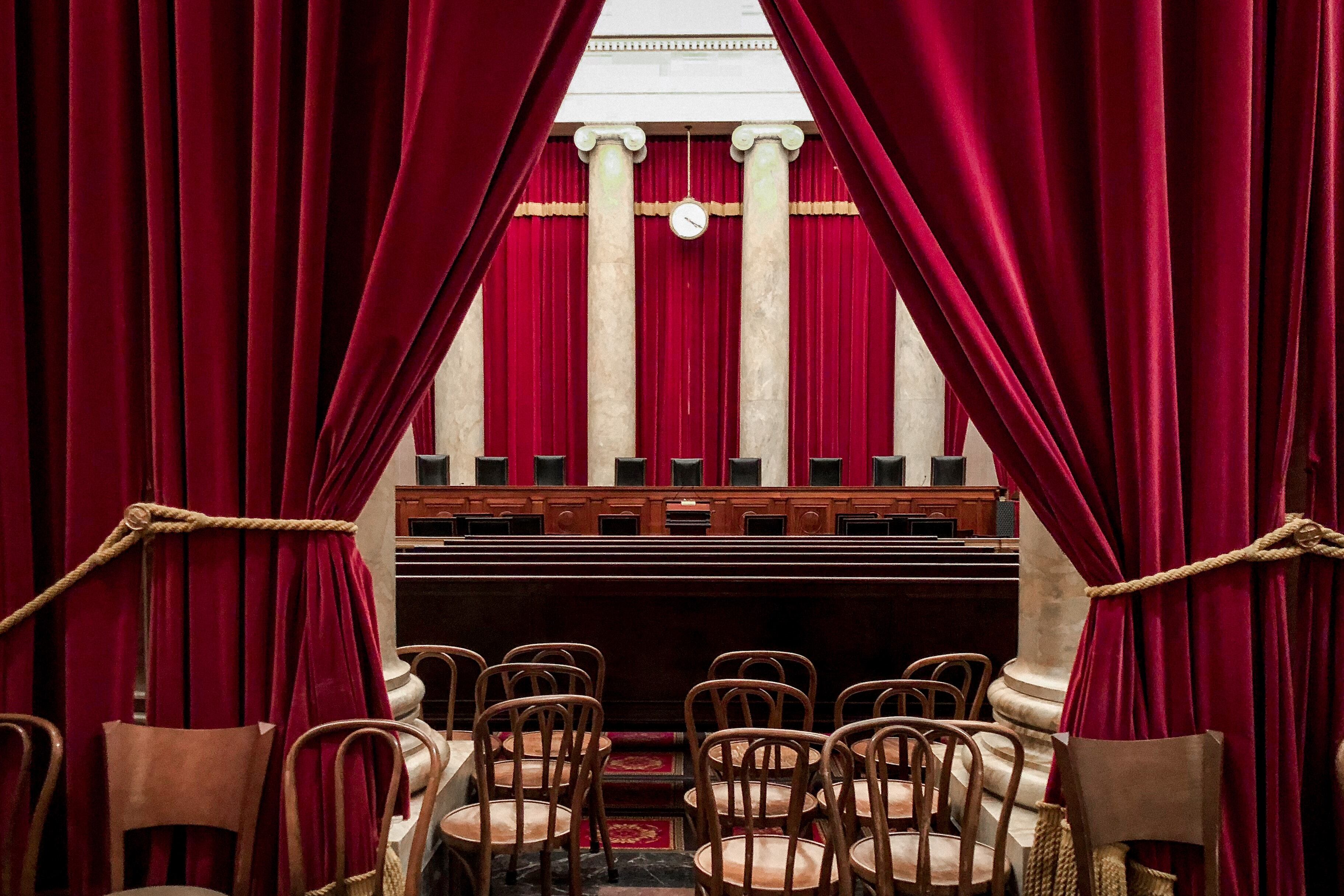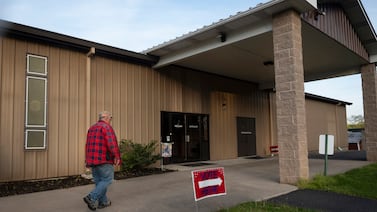A version of this post was originally distributed in Votebeat’s weekly newsletter. Sign up here.
The U.S. Supreme Court upheld two Arizona voting laws, disagreeing with the 9th Circuit Court of Appeals that they represented disproportionate barriers to racial minorities at the ballot box. Thursday’s ruling in Brnovich v. DNC, which split the liberal and conservative justices, 6–3, was met with swift condemnations from voting groups and lauded as fair by conservatives.
The split was even clear in news coverage. While most news organizations wrote headlines that sounded something like, “Supreme Court keeps Arizona voter restrictions in place,” Fox went with, “Supreme Court upholds Arizona voter fraud protections.”
Writing for the majority, Justice Samuel Alito said that the Supreme Court ought only strike down a voting law when it represents a significant barrier to minority voting, and that plaintiffs did not show clear enough proof that either rule — one which banned out of precinct voting and the other that limited third party ballot collection — would do so. “Where a state provides multiple ways to vote,” he wrote, “any burden imposed on voters who choose one of the available options cannot be evaluated without also taking into account the other available means.”
In her dissent, Kagan ruled that the decision fundamentally changed the Voting Rights Act rather than simply rule based on its guidance, which she wrote was inappropriate. “Maybe some think that vote suppression is a relic of history — and so the need for a potent Section 2 has come and gone,” Kagan wrote. “But Congress gets to make that call. Because it has not done so, this Court’s duty is to apply the law as it is written. The law that confronted one of this country’s most enduring wrongs; pledged to give every American, of every race, an equal chance to participate in our democracy; and now stands as the crucial tool to achieve that goal.”
The justices appear to be — as do the advocacy groups reacting to the justices and the news organizations covering them — in fundamental disagreement on basic issues: What should be considered a barrier, major or otherwise, and what the Voting Rights Act should do. These are weighty disagreements, but broadly considered they mean that none of the groups on either side agree on the fundamental truths of the reality of voting in America, and that’s a dangerous place to be. As Americans fight among themselves on how much fraud (not much) happened in 2020, the country’s brightest legal minds cannot reach consensus on the reality that minorities in this country face disproportionate barriers even if those barriers are not explicitly racially motivated.
The decision has been made during the most significant period of change in voting in modern history, and shines new light on Democrats’ efforts to navigate a voting bill through Congress — something they’ve so far been unable to do — at the same time as their Republican colleagues in state legislatures have had enormous success passing restrictive legislation. Given Congressional Democrats’ failures here, the Department of Justice announced it would intently scrutinize the effects of these laws, but this week’s SCOTUS decision means that the Voting Rights Act is a significantly less valuable tool in that ongoing fight.
The DOJ has already announced it would sue Georgia over its voting law, and will now have to reconsider its strategy given the new interpretation of the Voting Rights Act. “The court today also makes it harder to prove intentional racial discrimination in passing a voting rule, making it that much harder for D.O.J. to win in its suit against the new Georgia voting law,” Richard L. Hasen, a law professor at the University of California, Irvine, wrote in a blog post.
Back Then
The Supreme Court has issued completely contradictory guidance on voting issues over the decades, and has done so repeatedly. In the late 1800s and early 1900s, for example, the court took turns upholding essentially all major forms of disenfranchisement that were popular after the passage of the 13th, 14th and 15th Amendments. In 1898, it upheld Mississippi’s literacy test, ruling that it did not violate the 15th Amendment because it was not specifically designed to discriminate against Blacks. It further ruled that the court had no power to punish individuals who interfered with a Black voter’s ability to cast a ballot, only states as a whole. When the court made exceptions during this period, it was generally because the law in question was so obviously racially discriminatory it could not be believably ignored. In 1915, the court struck down grandfather clauses from Oklahoma and Maryland because, well, obviously. Oklahoma’s law, similarly to Maryland, required all voters to pass a literacy test to vote unless their grandfather had served as a soldier. This, as a result, allowed illiterate whites to vote but barred illiterate Blacks, whose ancestors almost certainly had not been soldiers and had instead been enslaved.
In Other Voting News
- New York City election administration is a hot mess, ya’ll. But of course, it’s been a steaming pile for quite some time, as many news articles and angry editorial board opinions this week have detailed. Partial tallies the Board of Elections released in the Democratic mayoral primary earlier this week inadvertently included 135,000 test votes, tipping the city’s already-tense first real test of ranked-choice voting into chaos. So the BOE tossed the numbers and issued a new tally. Now, the nonprofit that created the software used by the city has said that the BOE ignored their offer to help carry out the first go. Eric Adams currently maintains a thin lead.
- Bonus: A chuckle. Because if we can’t laugh about this, I’ll just have to cry.
- Read Spotlight PA and Votebeat’s coverage of the Pennsylvania governor’s veto of a Republican-backed voting rehaul, which our reporter Marie Albiges writes makes “clear his party’s opposition to stricter voter ID requirements and [sets] up a potential showdown on the issue at the ballot box.”
- The League of Women Voters in Kansas has suspended registration efforts while a court determines the legality of their processes. This comes after the Kansas legislature passed a slew of new laws this year, among them a rule “that makes it a felony to cause someone to believe another person is an election official.” What does that mean? Totally unclear, but LWV says that their volunteers are often mistaken for county officials and has no plans to allow any of them to go to jail.
- Arkansas State Rep. Mark Lowery, R-Maumelle, who authored the state’s 2017 voter ID bill, has announced his bid for secretary of state. He was also a sponsor of this year’s bill that restricted voting on the thin grounds of security.
- The 5th Circuit Court of Appeals has upheld sanctions against Democratic activist lawyer Marc Elias. The court indicates the sanctions were levied because Elias and his team reintroduced an identical motion that had been denied months before in a case over straight ticket voting in Texas, without disclosing the denial. Represented by Paul Clement, who served as U.S. solicitor general under President George W. Bush, Elias’s team said the move had been meant to supplement the record and was not an act of bad faith. The judges said no bad faith was required for the sanction.
- A bipartisan group of Colorado clerks is calling for significant transparency moves they say will advance the already-high standards for elections in the Western state, including a signature-verification audit system and publishing images of all ballots online.
- South Carolina’s election commission faced hours of grilling from the legislature over its voter list maintenance, with activists on both sides making their very deeply held convictions known. It included one woman who has taken it upon herself to monitor local obituaries to ensure the dead are promptly removed from the rolls.
Votebeat’s Ballot Battle
Regular readers of Votebeat will know that we hosted an online quiz show this week called Ballot Battle. Congrats to winner Dave O’Brien—as well as finalists Spenser Mestel and Dale Watt. After the first round of the quiz, our panelists Maurice Turner, Michael Miller, and Paul Gronke explained the elusive answers to the trickiest questions and why those facts matter—like Maurice’s insight about the $3,000 cost of the Diebold Accuvote-TS electronic voting machine. If you missed it, you can watch the recording here using the password ballotbattle2021!.
In His Downtime
Speaking of Maurice, who’s the cybersecurity fellow at the Alliance for Securing Democracy, you probably don’t know that his other passion is — no joke — underwater photography.

Maurice started doing serious photography in 1994 — but stayed on land until he was scuba certified in 2019 — “as a way to relax and be creative in some place warm as a break from the winter weather.” And he certainly did, diving shortly after with sharks in a Dubai mall that features an huge aquarium.
“Taking photos underwater reminds me of elections because both require tremendous focus and attention to detail. Something unexpected always happens—sometimes it’s my fault, other times it’s out of my control,” he said. “You have to have a solid plan to manage those situations without making the problem worse. I end every dive with a sense of accomplishment and humility, knowing that there’s always something I can improve for the next time. Plus you get to meet some really interesting people.”





